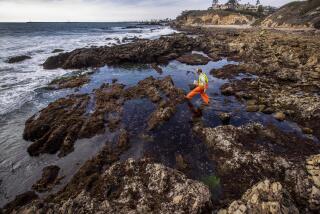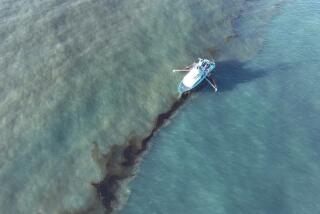ExxonMobil faces federal lawsuit over Arkansas oil spill
WASHINGTON — The Justice Department and the state of Arkansas filed suit against the oil giant ExxonMobil over a March 29 pipeline rupture that spilled 210,000 gallons of oil into a residential neighborhood and waterways in the small town of Mayflower.
The spill prompted evacuations, killed wildlife, polluted wetlands and a lake, and stirred health complaints from people living near the rupture site, north of Little Rock.
In the suit filed in federal district court, the Justice Department seeks civil penalties for violations of the Clean Water Act. The Arkansas attorney general is also pursuing civil penalties for violations of the Arkansas Hazardous Waste Management Act and the Arkansas Water and Air Pollution Control Act. The state also seeks to have ExxonMobil pay for all cleanup and removal costs under the federal Oil Pollution Act.
The ExxonMobil Pegasus pipeline split open just as the Obama administration entered the final phases of review for the far bigger, controversial Keystone XL pipeline, handing ammunition to opponents who say that Keystone’s path from Canada through major rivers such as the Platte and the Missouri and over the Ogallala aquifer, the main freshwater source for the Great Plains, could lead to a catastrophe.
The cleanup continues in Mayflower, where none of the 22 families evacuated on North Starlite Drive has returned home. The neighborhood is a “sea of ‘For sale’ signs,” said Glen Hooks, senior campaign representative for the Sierra Club in Arkansas.
“This spill disrupted lives and damaged our environment,” said Arkansas Atty. Gen. Dustin McDaniel. “It sullied our previously pristine water and our clean air. As the party responsible for this incident, Exxon is also responsible for the penalties imposed by the state for the damage to our environment, and the company should foot the bill for the state’s cleanup costs.”
ExxonMobil said it had not been served the complaint, so it could not respond to the charges.
“All I can say at this time is that we are aware of the filing; however, we have yet to review the allegations,” said spokesman Aaron Stryk. “That said, we will continue to cooperate with all federal, state and local agencies.”
In the wake of the Mayflower spill, Arkansas officials and residents have petitioned ExxonMobil to re-route a 13-mile portion of the Pegasus pipeline out of the watershed for Little Rock’s drinking-water source, Lake Maumelle. The company has not yet made a decision.
The 850-mile-long Pegasus pipeline carried about 95,000 barrels a day. Keystone XL would carry more than 800,000, making the consequences of a spill potentially far greater.
Keystone’s supporters point out that while the Pegasus pipeline is more than 60 years old, Keystone XL would be outfitted with state-of-the-art spill prevention and alert technology. But in April, the Environmental Protection Agency faulted the State Department, which is responsible for issuing the federal permit, for not demanding more spill safeguards in the Keystone XL project.
Around the time of the Arkansas spill in March, ExxonMobil was fined $1.7 million by the federal government for pipeline safety violations relating to a 2011 spill of about 63,000 gallons of oil into the Yellowstone River in Montana.
If the court rules against ExxonMobil, it would be liable under the Clean Water Act for $1,100 for each barrel spilled, or more than $4,300 per barrel if the court determines that the spill occurred due to gross negligence or misconduct.
The spill released an estimated 5,000 barrels into Mayflower. Under Arkansas law, the company could be charged an additional $10,000 per violation per day for every day that oil is in the environment, according to the complaint.
More to Read
Start your day right
Sign up for Essential California for news, features and recommendations from the L.A. Times and beyond in your inbox six days a week.
You may occasionally receive promotional content from the Los Angeles Times.






